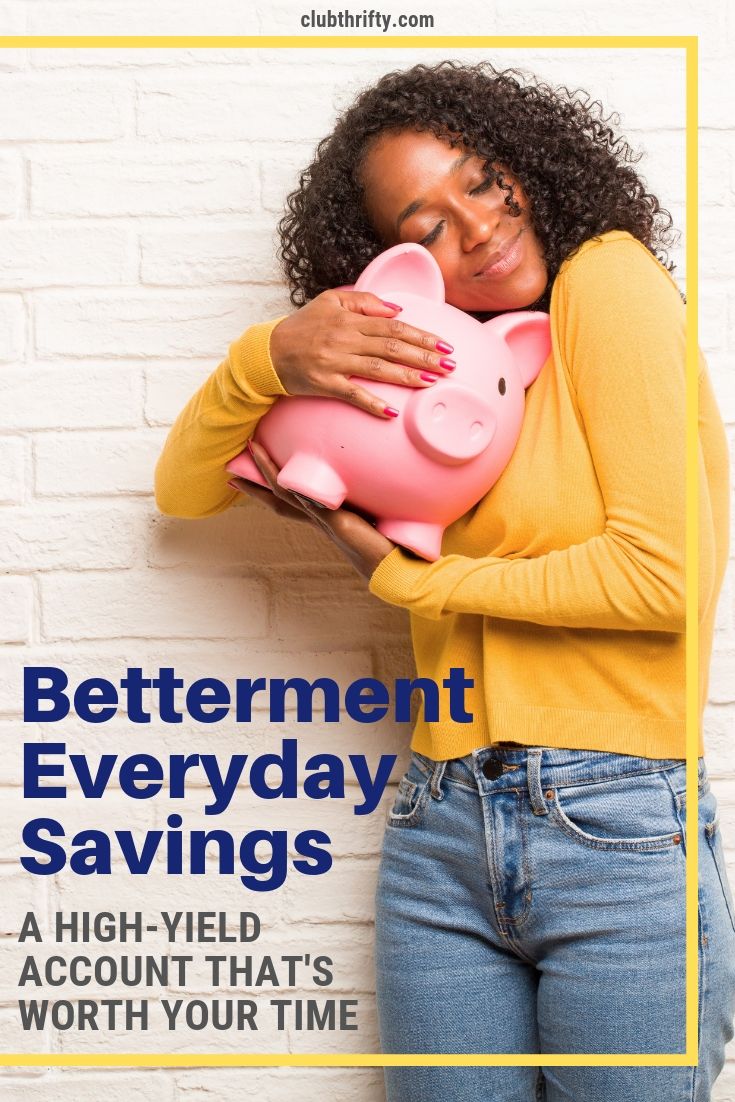Betterment Cash Reserve Review: Earn High Yields on Your Savings

This article may contain references to some of our advertising partners. Should you click on these links, we may be compensated. For more about our advertising policies, read our full disclosure statement here.
In this Betterment Cash Reserve review, we explain how the account works, explore the best ways to use it, and determine if it is a good fit for your savings needs.
The Betterment Cash Reserve account is a straightforward way to help you save and reach your financial goals. It boasts one of the top interest rates of any high-yield savings account and provides more bang for your buck than traditional banking options.
Primarily known for their robo-advisor investment services, Betterment has evolved to offer several money management products and services. The recently rebranded Cash Reserve account is an upgrade to the Smart Saver account which they previously offered. Since shuttering the Smart Saver line, the Cash Reserve account has also been known as the Everyday Savings and the Everyday Cash Reserve.
Betterment Cash Reserve accounts are FDIC-insured. (Smart Saver accounts were not.) The account has no minimum balance requirement, and you can currently earn up to 2.25% APY on your money.
As with all financial products, you should know what you’re getting into before diving in headfirst. Here’s an in-depth look at what you need to know before opening a new account.
Betterment Cash Reserve at a Glance 
- Grow your money with high-interest savings
- FDIC-insured up to $1,000,000
- Internet banking made easy across the U.S.
- Partners with well-known banks to maximize savings
Betterment Cash Reserve: Pros and Cons
| Betterment Cash Reserve: Best Features | Betterment Cash Reserve: Where They Fall Short |
|---|---|
| History of high interest rates | Low name recognition |
| FDIC-insured up to $1,000,000 | Joint accounts not offered yet |
| Unlimited withdrawals | |
| Transfers take just 1 to 2 business days | |
| No monthly fees | |
| Low initial deposit requirement |
Who Is Betterment?
Betterment has been around since 2008, and most people recognize them for their robo-advisor investment services. The Cash Reserve account is a relatively recent addition to their product offerings, and — until the recent economic downturn — the account’s rates had been outstanding.
It is important to note that Betterment is not a bank. They are registered with the SEC as an investment advisor. So, how in the world can they have a savings account?
Good question.
Betterment partners with some of the best banks in the industry to offer a great savings account. As of March 22, 2021, Betterment Cash Reserve program banks include:
- The Bancorp Bank
- Barclays Bank Delaware
- Citibank, N.A.
- Cross River Bank
- HSBC Bank USA, N.A.
- State Street Bank and Trust Company
- Wells Fargo Bank, N.A.
Even though Betterment partners with these banks to provide a first-rate savings account, you never have to deal with any of them yourself. Betterment takes care of all of that on the backend so you can focus on your money.
Your deposits are also FDIC-insured up to $1,000,000 which is above and beyond the typical $250,000 you see at a single bank. This is because the account is structured in a way that will spread your money around to different partner banks. Effectively, you’ll have different accounts at each bank, allowing for increased FDIC insurance limits under the single umbrella of your Betterment account.
To take their banking offerings to the next level, they recently released a fee-free checking account as well. Learn more about Betterment Checking here.
Betterment Cash Reserve Highlights
The Cash Reserve account from Betterment charges zero fees on your account balance and offers interest rates up to 2.25% APY. A $10 minimum deposit is required for all new accounts.
Even better, unlike some other savings accounts, the Betterment Cash Reserve account offers unlimited withdrawals. This means you can transfer money in and out of the account as many times as you want without worrying about penalties or paying extra fees. Keep in mind, though, you want to save money, not spend it.
Adding money is easy. Simply link another bank account to your Betterment account, and you’re good to go. The FDIC insures funds in the account for up to $1,000,000. Again, this is more than the typical $250,000 per account limit.
It is also important to note that the Betterment Cash Reserve account is a true savings account, not an investment account. Your cash isn’t invested but can still grow as it earns interest. Your risk is also limited because the account is FDIC-insured.
How to Use a Betterment Cash Reserve Account
Everyone has different money needs, and Betterment’s Cash Reserve is extremely flexible. With no restrictions on how often you can transfer money back and forth, the account has a ton of potential. Here are a few ways you might want to use it:
Vacation Fund – Taking out a loan to pay for your vacation or putting it on your credit card is rarely a good idea. Instead, set up a separate account to reach your travel goals. You’ll be free to enjoy a fantastic escape without the guilt of creating more debt.
Emergency Fund – Keeping your emergency fund in a separate account is a smart choice whether you’re still building it or already have the recommended 3 to 6 months’ worth of living expenses. By keeping the money separate, you aren’t tempted to spend it on things it wasn’t meant for.
Down Payment – Buying a house or a car? Those don’t come cheap. Have a special place to stash your money when saving for a down payment. Your cash will grow faster with the higher interest rate, too.
Big Purchases – Savings accounts are the perfect way to save for big purchases. If you’ve got your eye on a boat or are thinking of splurging on new furniture, set aside a little cash each week to make your dreams a reality.
Benefits of Using Betterment Cash Reserve
- Excellent Interest Rate – Betterment Cash Reserve pays the same interest no matter how much (or how little) money you have in your account. Currently, you’ll earn 2.25% APY on all balances.
- Unlimited Withdrawals – Some savings accounts still restrict the number of transactions you can make per statement cycle, but you don’t have to worry about that with this account. With this account, there’s no limit to how many transfers you make.
- Low Initial Deposit Requirement – Betterment Cash Reserve helps you make the most of your money, and you only need a minimum deposit of $10 to build your savings.
- No Fees – There are no fees on your account balance and no minimum balance to maintain.
- FDIC-insured – The FDIC insures funds in the account for up to $1,000,000.
Where Betterment Cash Reserve Falls Short
With no fees, unlimited withdrawals, and a high interest rate, Betterment Cash Reserve is tough to beat. Nothing in life is perfect, however, and there are a few spots where this account could improve.
The most obvious downside is the low name recognition. Betterment got its start as an investing platform and is branching out to offer more products. If you’re not into investing, there’s a good chance you’ve never heard of Betterment. Still, their Cash Reserve account is a good product. The company will give bigger banks a run for their money as the word spreads.
With that said, while this account was offering some spectacular rates prior to the coronavirus pandemic, recent events have caused the rate to plummet. Currently, the rate stands at 2.25% APY. Although that is still better than you will find at most traditional banks, it doesn’t stack up to the higher rates currently being offered at the best online banks.
Is Betterment Cash Reserve Right for You?
Online banking has a lot of benefits over brick and mortar banks, including lower fees and higher interest rates. Still, some people prefer to do their banking in person. If that sounds like you, Betterment Cash Reserve might not be a good fit.
However, having an online account is easy to set up and to manage. Betterment Cash Reserve streamlines the process even further by allowing unlimited transfers in and out of the account. If you’re on the fence, consider giving online banking a shot.
A Cash Reserve account is a great place to store your emergency fund. It’s also a good place to stash cash for your vacation fund or other savings goals. As a bonus, you’ll earn a great interest rate with no extra work or risk.
How to Open a Cash Reserve Account
Betterment makes opening a Cash Reserve account easy, and it only takes a few minutes to get it set up. Before you start, it’ll be helpful if you have your driver’s license and Social Security number close by.
- Open an Cash Reserve account here.
- Enter your email address and pick a password, then fill in your personal information.
- Connect an existing bank account to deposit at least $10 to your new account.

Frequently Asked Questions
No. Betterment is an investment firm registered with the SEC. Money deposited into Betterment Cash Reserve is held at partner banks.
Yes. Because Betterment Cash Reserve spreads your deposit between multiple banking partners, your deposits are insured by the FDIC for up to $1 million.
To open a Betterment Cash Reserve account, a minimum deposit of just $10 is required.
No. There are no minimum balance requirements and fees are not charged on your balance.
Although savings accounts at traditional banks limit you to six transactions per month, Betterment Cash Reserve provides unlimited withdrawals.
Betterment Cash Reserve Review: The Bottom Line
With a super-low opening deposit of $10, anyone can take advantage of what Betterment Cash Reserve has to offer. The biggest benefit is the 2.25% APY.
Betterment also offers a checking account with no account fees, overdraft fees, or minimum balance requirements. That’s hard to beat.
Even if you stick to the Cash Reserve account, you still come out ahead. You can move your emergency fund there to earn more interest right away. When you’re ready, adding money for your vacation fund or other financial goals is easy to do with the click of a button.








Disclaimer: Comments, responses, and other user-generated content is not provided or commissioned by this site or our advertisers. Responses have not been reviewed, approved or otherwise endorsed by this website or our advertisers. It is not the responsibility of our advertisers or this website to ensure that all comments and/or questions are answered. Club Thrifty has partnered with CardRatings for our coverage of credit card products. Club Thrifty and CardRatings may receive a commission from card issuers.